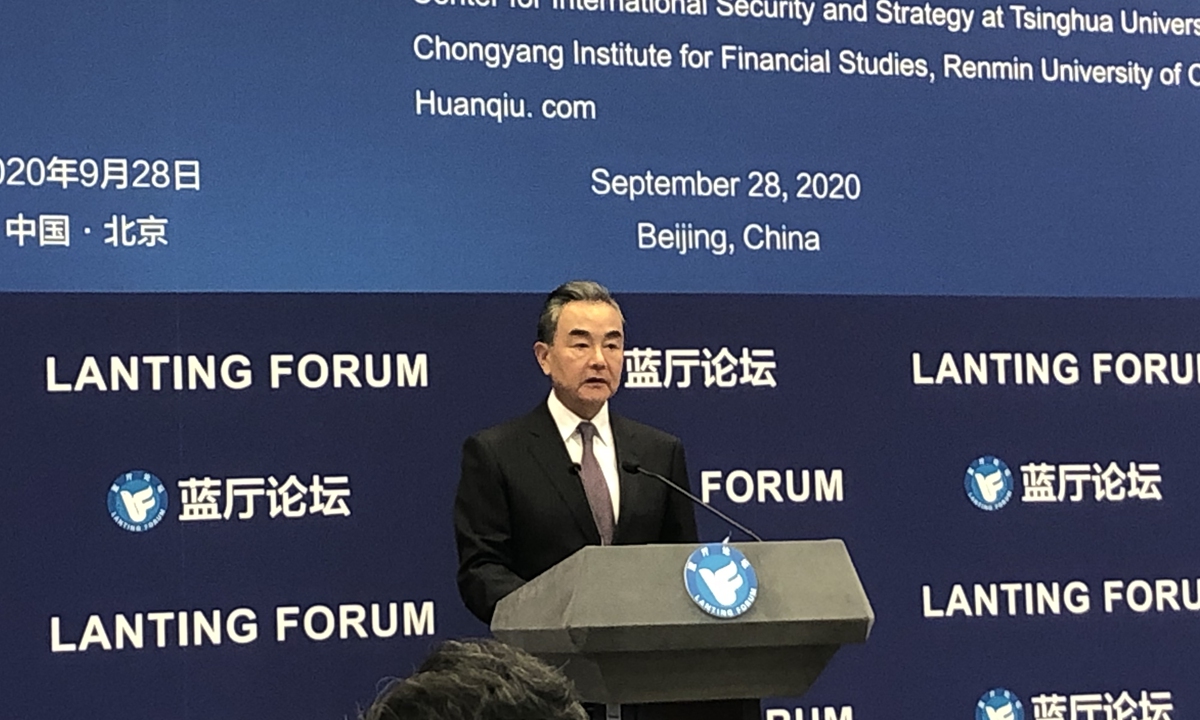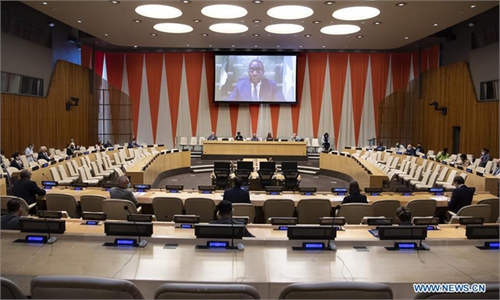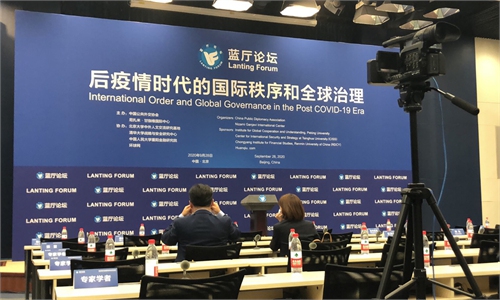
Chinese State Councilor and Foreign Minister Wang Yi delivers an address at the Lanting Forum in Beijing on Monday. Photo: Wang Wenwen/GT
Editor's Note:Under the theme "International Order and Global Governance in the Post-COVID-19 Era," the Lanting Forum was held at China's Ministry of Foreign Affairs on Monday. Jointly organized by the China Public Diplomacy Association and the Nizami Ganjavi International Center, the forum gathered officials, scholars and economists worldwide to participate. The following are speeches given by three speakers.
Fu Ying, Former Vice Minister of Foreign Affairs of China, Chairperson of Center for International Security and Strategy at Tsinghua University
The biggest issue in the world today is how to best cope with the COVID-19 pandemic. Not only the governments of countries are doing everything they can to improve domestic public health management, the international community is also in urgent need to improve global governance. Our world, however, is not as united as it should be in the face of this worldwide crisis. Instead, politicians from some countries have been attempting to politicize the prevention and control efforts. As a result, global coordination mechanisms are not able to raise the efficiency as expected.
The US has been playing a leading role in the world affairs for a long time. And it is most disappointing that it fails to play a constructive role in this fight. Since the initial outbreak of the pandemic, Washington has been arrogant, incompetent and unwilling to cooperate. Meanwhile, right-wing forces in the US are advocating for unilateralism, deconstructing the global governance system based on multilateralism, in total disregard of the interdependence of nations formed in the course of economic globalization. In terms of relations with China, they are trying to take advantage of the pandemic to decouple from China, thus advancing confrontational competing strategies and protecting US hegemony through a zero-sum approach.
What is the right direction? This year marks the 75th anniversary of the founding of the United Nations. On September 22, President Xi Jinping delivered a speech via video from Beijing and emphasized at the general debate of the 75th session of the United Nations General Assembly that "multilateralism, epitomized by the UN, is the only way that the contemporary world can work well."
People's original intentions of promoting multilateralism were to settle the issue of "peace and war" once and for all. The core values of multilateralism suit the common interests of all countries. The vitality of multilateralism lies in a win-win spirit, and it is the only way to prevent the spread of extreme and retrogressive forces. What's encouraging is that, as the world is entering the third decade of the 21st century, voices supporting globalization, multilateralism and improvement of global governance continue to present the mainstream in the international community.
China believes in and supports multilateralism. We believe a diversified co-existence plays a key role in multilateralism. Our world calls for interconnection and interdependence among countries. The relations among major powers can only remain on track through mutually beneficial cooperation and fair competition. So-called "decoupling," on the other hand, goes against the trend of the times.
Another key foundation for multilateralism is balance. Balance forms the foundation of stability in the world. In diplomacy, all countries should consider a balance among their own interests, security and development. Facing major power competition, many medium and small-sized countries have chosen a balanced diplomacy rather than taking a side, which indeed reflects the characteristics of a multilateral era.
China has been actively carrying out bilateral and multilateral cooperation during its fight against the epidemic. Many private enterprises in China have utilized their resources and provided anti-epidemic supplies to Europe, Africa, Latin America, and the US. The spirit of selflessness and internationalism demonstrated by Chinese people and enterprises showcases the foundation of China's multilateral mindset and policies.
Despite this, some outsiders remain suspicious about China's intentions and worry that China's global cooperation may involve strategic plans. However, China has shown the world through its actions what the spirit of a community of shared future for mankind really means. If China has any intentions, they are only about contributing to the world's future peace and development.
Multilateralism is the only solution for the international community to cope with new problems and challenges. We have to realize what global citizens truly care about and need. The foundation of better global governance should be built upon safeguarding humanity and focusing on people's livelihoods, welfare and development. To make this happen, the practice of common security and cooperative development is essential for countries.
Martin Jacques, a former senior fellow at the Department of Politics and International Studies at Cambridge University
COVID-19 has served to poison global relations and exacerbate tensions. Why? The primary reason was the already deteriorating relationship between the US and China. From the outset, COVID-19 was played out in that context. From the outset China was the subject of a vitriolic and quite shocking attack in the Western media and by Western politicians for its secrecy and alleged cover-up. Such was the venom of this assault that, certainly in Western countries, it had a negative impact on popular attitudes towards China. Although the tsunami of abuse has significantly subsided, serious damage has been done to the prospects for global cooperation.
A secondary reason why COVID-19 has negatively impacted global governance is that such was the scale of the threat, the fear and concern that was engendered at all levels of societies, the size of the challenge confronting national governments, that countries tended to look inwards rather than outwards. National debate, argument and action became all- consuming and largely eclipsed a desire to learn from others.
Everywhere COVID-19 has been an enormous test of governance. It is difficult to think of an obvious equivalent other than war. Like war, it has been highly revealing with regard to the competence of national governance. There have, broadly speaking, been three main types of responses: first, that in East Asia, including China, South Korea and Japan. There have, of course, been important differences but it is the commonalities that are most striking. First the role and sheer competence of government and the respect that government enjoys amongst the people. Second, the collectivist instincts of the people and the social discipline that this engenders. The wearing of masks, for example, unlike anywhere else, is not a subject of debate: it is universally observed. Third, in all these countries the objective is the suppression and elimination of the virus rather than simply its containment. This is seen as a precondition for economic recovery. They have all been remarkably successful at fighting the virus, with China's performance, given its size, extraordinary.
The second type of response, that of Western European countries, has, with varying degrees of success, been to contain rather than eliminate the virus. This has been accompanied by continuous debates about the role of government versus the rights of the individual and the needs of the economy versus the right to life. They have been far less successful in fighting the virus than the East Asian countries.
The third type of response, that of the US and Brazil, has been a disaster: fighting the virus has been seen as secondary and an inconvenience rather than the fundamental priority. Unsurprisingly, huge numbers have died as a consequence. The role of government has been played down compared with the rights of the individual and the needs of the economy have been prioritised over fighting the virus.
The ramifications of these different approaches will be profound. In the longer run it will surely lead to a growing debate about the relative merits of these different forms of governance, a debate which hitherto has largely taken place on the side lines. The failure of the American approach under Trump - alongside the failure of US economic policy over the last two decades - is bound to further weaken America's waning global influence.
My final general point concerns global governance and the international order in the wake of COVID-19. It is difficult to be optimistic. The US and China are now much further apart than was the case at the beginning of this year. A new kind of cold war is well underway. This will weaken the possibilities of global governance. The clearest example of this has been America's withdrawal from WHO and curtailing its funding. It is possible that Biden's election might create a more favourable outlook for global cooperation but it is very unlikely there will be a return to the status quo ante. Progress regarding global governance is more likely to assume, for the foreseeable future, a regional form. An obvious - and encouraging - example is that China and the European Union appear to be taking a parallel track on carbon dioxide emissions, which would be extremely important for any serious progress on the Paris climate agreement. Similarly, the Belt and Road Initiative offers the prospect of new forms of intra-national cooperation.
John Ross, Senior Fellow of Chongyang Institute for Financial Studies, Renmin University of China
Clearly, the world faces its deepest global crisis since World War II - with the simultaneous coming together of three profound threats in the short, medium and longer terms.
First, the short-term threat to literally millions of lives from the COVID-19 pandemic - which in turn produces an economic crisis.
Second, medium/longer-term economic stagnation in the advanced parts of the world economy - growth in advanced economies was cumulatively slower than after 1929, with consequent social and geopolitical tensions, before the world was thrown into its deepest economic recession since the Great Depression by COVID-19.
Third, a longer-term trajectory toward climate change, which would reach levels with catastrophic consequences for humanity, which there is only a limited period of time to stop and which must therefore be tackled starting in the short term - a period which will be profoundly affected by the patterns of economic recovery from the COVID-19 economic downturn.
All are best tackled by an internationally coordinated response.
Faced with the 2008 international financial crisis there was a degree of international coordination in the response via the G20 - it was not completely adequate but it played a significant role. Discussions between the US under President Obama and China led to the Paris Climate change agreement of 2016.
Unfortunately, since 2016 the US has moved into unilateralism, particularly its withdrawal from Paris Climate Change Accords, withdrawal from WHO, creating paralysis in the WTO and refusal to participate in internationally coordinated response to COVID-19.
It is vital for other parts of the world to cooperate on all three current crises because they are interrelated - this response will of course be seriously strengthened if the US returns to the path of multilateralism.
There is pessimism on global cooperation on COVID-19. The world is divided into two strategies - Western Pacific countries have followed an "elimination" or "zero COVID-19" strategy for coronavirus with rapid results. But the US and the EU have not. Unless there is a rapid breakthrough on a vaccine, pessimism remains regarding the US and the EU and real possibilities of international cooperation. Nonetheless, there will be cooperation in the much more medically successful countries in the West Pacific.
Cui Hongjian, director of the Department of European Studies, China Institute of International Studies
The COVID-19 pandemic and the competition between major powers have become the severest challenges to international politics. Deficiencies in global governance have been further exposed and multilateralism has been challenged. But to finally defeat the pandemic and maintain the balance of the international system, multilateralism is an indispensable solution.
First, reinvigorating multilateralism requires a broad, rather than an exclusive consensus in the international community. All countries should actively participate in the discussion, and their solutions from their own perspectives should be encouraged rather than opposed. Some tend to limit the scope of multilateralism to certain specific subjects, but exclude or deliberately downplay other subjects. If such problems are not solved, then multilateralism will finally become a hollow word. This will not help solve problems and will harm mutual trust.
Some are also worried that China will use the Belt and Road Initiative (BRI) to promote its own rules. The fact is, if these rules are in line with multilateralism and benefits all sides, then why not? All sides should be open in terms of rules. Some countries want to benefit from the BRI, while they also want to exclusively dominate the rules. Such mentality is not multilateral.
Second, reviving multilateralism will require adapting to changes in the international community, and building a stable and sustainable international order should be its goal. During the UN General Assembly's 75th anniversary meeting, UN Secretary-General Antonio Guterres mentioned building an inclusive and networked multilateralism. This means adapting to changes in the international environment brought by globalization.
Third, reviving multilateralism is not a privilege of moderately developed countries, nor is it a policy tool of powerful countries. Its path should include international mechanisms, regional cooperation, multilateral coordination and greater responsibilities for major powers. Multilateralism should be open cooperation, not a small circle of competition and exclusion. If people believe that a closed and exclusive small circle tailored for few countries is called multilateralism, then it is doomed to fail.
And last but not least, reinvigorating multilateralism requires the international community to jointly maintain a sustainable environment, set clear goals and take joint actions. Some countries' unilateral acts have severely challenged multilateralism. Global division of labor and free trade are the foundations of multilateralism. Thus, insisting on economic openness and cooperation should be the primary goal of reviving multilateralism.
Major powers may have disputes on some issues, but they should not refuse to cooperate on other areas. All sides need to communicate and seek consensus. To this end, responding to the COVID-19 and climate change are the most significant areas where the international community can take joint action.


